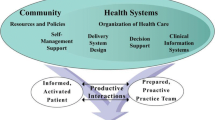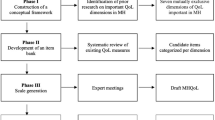Abstract
Background
Self-management is widely accepted as an essential component of chronic care. Nevertheless, little is known about patients’ perceptions of self-management.
Purpose
This study aims to explore which self-management tasks and support needs people with chronic illness perceive for themselves, and to establish whether these tasks and support needs are disease specific.
Methods
A nationwide representative sample of 2,064 people with chronic disease filled in the Patient Assessment of Self-management Tasks questionnaire.
Results
Many respondents perceive self-management tasks in the daily management of their condition, although few indicate a need for support. Respondents who feel a need for support in one aspect of self-management are likely to feel a need for support in other aspects as well. Type of disease has a small effect on self-management tasks and even smaller on support needs.
Conclusion
Although the self-management tasks patients perceive may be partly disease specific, self-management support does not necessarily need to be disease specific.
Similar content being viewed by others
References
Yach D, Hawkes C, Gould C, Hofman K. The global burden of chronic disease: overcoming impediments to prevention and control. JAMA. 2004; 291: 2616-2622.
WHO. Global Status Report on Global Non-communicable Disease 2010. Geneva: WHO Document Production Services; 2011.
Barlow J, Wright C, Sheasby J, Turner A, Hainsworth J. Self-management approaches for people with chronic conditions: a review. Patient Educ Couns. 2002; 48: 177-187.
Clark N, Becker M, Janz N, Lorig K, Rakowski W, Anderson L. Self-management of chronic disease by older adults. J Aging Health. 1991; 3: 3-27.
Glasgow R, David C, Funnell M, Beck A. Implementing practical interventions to support chronic illness self-management. Joint Comm J Qual Safety. 2003; 29: 563-574.
Lorig K, Holman H. Self-management education: history, definition, outcomes and mechanisms. Ann Behav Med. 2003; 26: 1-7.
Redman B. The ethics of self-management preparation for chronic illness. Nursing Ethics. 2005; 12: 360-369.
Newman S, Steed L, Mulligan K. Self-management interventions for chronic illness. Lancet. 2004; 364: 1523-1537.
Jerant AF, Von Friederichs-Fitzwater MM, Moore M. Patients’ perceived barriers to active self-management of chronic conditions. Patient Educ Couns. 2005; 57: 300-307.
Jordan J, Osborn R. Chronic disease self-management education programs: challenges ahead. Med J Aust. 2007; 186: 84-87.
Rijken M, Jones M, Heijmans M, Dixon A. Supporting self-management. In: Nolte E, McKee M, eds. Caring for People with Chronic Conditions. A Health System Perspective. Berkshire, UK: Open University Press; 2008: 116-142.
Warsi A, Wang P, LaValley M, Avorn J, Solomon D. Self-management education programs in chronic disease: a systematic review and methodological critique of the literature. Arch Intern Med. 2004; 164: 1641-1649.
Foster G, Taylor SJ, Eldridge SE, Ramsay J, Griffiths CJ. Self-management education programmes by lay leaders for people with chronic conditions. Cochrane Database Syst Rev. 2007;CD005108.
Deakin TA, McShane CE, Cade JE, Williams R. Group based training for self-management strategies in people with type 2 diabetes mellitus. Cochrane Database Syst Rev. 2005;(2):CD003417.
Gibson PG, Powell H, Wilson A, et al. Self-management education and regular practitioner review for adults with asthma. Cochrane Database Syst Rev. 2002;(2):CD001117.
Gardetto N. Self-management in hearth failure: where have we been and where should we go? J Multidiscip Healthc. 2011; 4: 39-51.
Ursum J, Rijken M, Heijmans M, Cardol M, Schellevis F. Zorg voor chronisch zieken: Organisatie van zorg, zelfmanagement, zelfredzaamheid en participatie. Utrecht: NIVEL; 2011.
Trappenburg J, Jonkman N, Jaarsma T, et al. Self-management: one size does not fit all. Patient Educ Couns. 2013; 92: 134-137.
DiMatteo M, Haskard K, Williams S. Health beliefs, disease severity, and patient adherence. A meta-analysis. Med Care. 2007; 45: 521-528.
Jansen D, Grootendorst D, Rijken M, et al. Predialysis patients’ perceives autonomy, self-esteem and labour participation: associations with illness perceptions and treatment perceptions. A cross-sectional study. BMC Nephrol. 2010;11.
Kaptein A, Hughes B, Scharloo M, et al. Illness perceptions about asthma are determinants of outcome. J Asthma. 2008; 45: 459-464.
Leventhal H, Diefenbach M. Illness cognition: using common sense to understand treatment adherence and affect cognition interactions. Cogn Ther Res. 1992; 16: 143-163.
Scharloo M, Kaptein A, Weinman J, et al. Illness perceptions, coping and functioning in patients with rheumatoid arthritis, chronic obstructive pulmonary disease and psoriasis. J Psychosom Res. 1998; 44: 573-585.
Lazarus R, Folkman S. Stress, Appraisal, and Coping. New York: Pergamon; 1984.
Heijmans M, Rijken M, Foets M, De Ridder D, Schreurs K, Bensing J. The stress of being chronically ill: from disease-specific to task-specific aspects. J Behav Med. 2004; 27: 255-271.
Lorig KR, Ritter P, Stewart AL, et al. Chronic disease self-management program: 2-year health status and health care utilization outcomes. Med Care. 2001; 39: 1217-1223.
Rijken M, Bekkema N, Boeckxstaen P, Schellevis FG, Maeseneer JM de, Groenewegen PP. Chronic Disease Management Programmes: an adequate response to patients’ needs? Health Expectations. 2012.
Rijken M, Bensing J. Het nationaal Patiëntenpanel Chronisch Zieken. Een onderzoeksinfrastructuur voor patiëntengericht onderzoek. Utrecht: NIVEL; 2000.
Rijken M, Groenewegen P. Money does not bring well-being, but it does help! The relationship between financial resources and life satisfaction of chronically ill mediated by social deprivation and loneliness. J Commun Appl Soc Psychol. 2008; 18: 39-53.
Bayliss E, Steiner J, Fernald D, Crane L, Main D. Descriptions of barriers to self-care by persons with comorbid chronic diseases. Ann Fam Med. 2003; 1: 15-21.
Lamberts H, Wood M. ICPD. International Classification of Primary Care. Oxford: Oxford University Press; 1987.
Hooper D, Coughlan J, Mullen M. Structural equation modelling: guidelines for determining model fit. Electron J Bus Res Methods. 2008; 6: 53-60.
Jörskog K, Sörbom D. LISREL 8: Structural Equation Modelling with the SIMPLIS Command Language. Chicago: Scientific Software International Inc.; 1993.
Hu L, Bentler P. Cutoff criteria for fit indexes in covariance structure analysis: conventional criteria versus new alternatives. Struct Equ Model. 1999; 6: 1-55.
Dekker J, Rijken M, van Poppels M, de Bruin A. The possession of technical aids among persons with somatic chronic disease. Disabil Rehabil. 2003; 26: 393-398.
Elissen A, Nolte E, Knai C, et al. Is Europe putting theory into practice? A qualitative study of level of self-management support in chronic care approaches. BMC Health Serv Res. 2013; 13: 117-126.
Rabiau M, Knauper B, Miquelon P. The external quest for optimal balance between maximizing pleasure and minimizing harm: the compensatory health beliefs model. Br J Health Psychol. 2006; 11: 139-153.
Acknowledgments
The authors thank all people who responded to the questionnaires.
Support
This study formed part of the research program “National Panel of people with Chronic illness or Disability”, which is financed by the Netherlands Ministry of Public Health, Welfare and Sports and the Netherlands Ministry of Social Affairs and Employment. This study is part of a PhD project that is financed by the Netherlands Ministry of Education, Culture and Science.
Authors’ Statement of Conflict of Interest and Adherence to Ethical Standards
Lieke van Houtum, Monique Heijmans, Mieke Rijken, and Peter Groenewegen declare that they have no conflict of interest. All procedures, including the informed consent process, were conducted in accordance with the Helsinki Declaration of 1975, as revised in 2000. According to the Dutch Medical Research Involving Human Subjects Act, this study does not require ethics approval.
Author information
Authors and Affiliations
Corresponding author
About this article
Cite this article
van Houtum, L., Rijken, M., Heijmans, M. et al. Patient-Perceived Self-Management Tasks and Support Needs of People with Chronic Illness: Generic or Disease Specific?. ann. behav. med. 49, 221–229 (2015). https://doi.org/10.1007/s12160-014-9649-0
Published:
Issue Date:
DOI: https://doi.org/10.1007/s12160-014-9649-0




